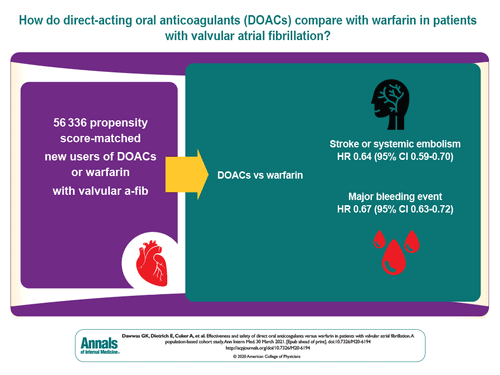By Ahmed El-Medany
A retrospective cohort study by Dawwas et al reports that DOACs, compared with warfarin, were associated with lower risks for ischemic stroke or systemic embolism, and major bleeding events, in patients with valvular AF.
Among 56,336 patients with valvular AF matched on propensity score, use of DOACs was associated with lower risk for ischemic stroke or systemic embolism (hazard ratio [HR], 0.64; 95% confidence interval [CI], 0.59-0.70) and major bleeding events (HR, 0.67; 95% CI, 0.63-0.72). The results for the effectiveness and safety outcomes remained consistent for apixaban (HRs, 0.54 [95% CI, 0.47-0.61] and 0.52 [95% CI, 0.47-0.57], respectively) and rivaroxaban (HRs, 0.74 [95% CI, 0.64-0.86] and 0.87 [95% CI, 0.79-0.96], respectively); with dabigatran, results were consistent for the major bleeding outcome (HR, 0.81; 95% CI, 0.68-0.97), but not for effectiveness (HR, 1.03; 95% CI, 0.81-1.31).
These results suggest that patients with a broad definition of valvular heart disease may be able to safely use DOACs.
However, considering the retrospective non-randomized nature of the current analysis, prospective validation is indicated.

Source: Dawwas GK, Dietrich E, Cuker A, Barnes GD, Leonard CE, Lewis JD. Effectiveness and Safety of Direct Oral Anticoagulants Versus Warfarin in Patients With Valvular Atrial Fibrillation: A Population-Based Cohort Study. Annals of Internal Medicine. 2021 Mar 30.
